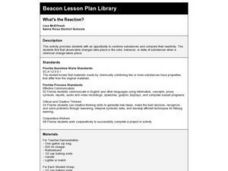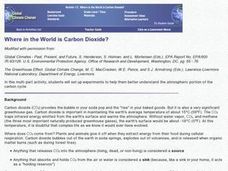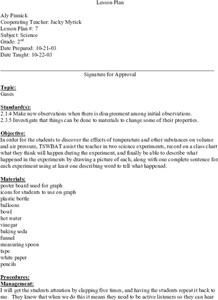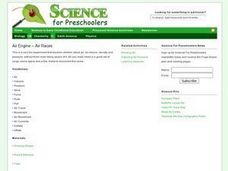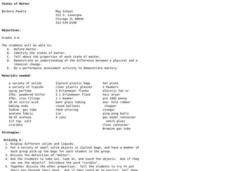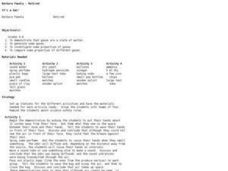American Chemical Society
What’s the Difference between Baking Soda and Baking Powder?
Introduce pupils to chemical reactions. Using the hands-on lesson, learners experiment with substances that combine to form a gas. Different substances react to form different amounts of gas, leading to a discussion about the particles...
Perkins School for the Blind
Conservation of Mass
How do you teach a student with visual impairments about the conservation of mass? You use tactile models that represent the theoretical concept. Baking soda and vinegar are used to add gas to a deflated balloon. Learners will feel the...
Curated OER
Gases Lighter and Heavier than Air
Students explore the concept of air density. In this air density lesson plan, students fill balloons with helium and carbon dioxide. Students determine which gases are heavier or lighter than air.
Curated OER
Sometimes, solid + liquid = gas
Third graders experiment with common household liquids and solids. In this chemical reaction lesson, 3rd graders discuss phase changes and experiment to find other ways to create gases. They use water, vinegar, lemon juice, flour, baking...
Curated OER
Three States of Matter
Third graders investigate the three states of matter and the properties of materials as they undergo physical changes. They identify examples of each type of matter, role-play atoms in solids, liquids, and gases, and conduct an...
Curated OER
What's the Reaction?
Learners combine baking soda and vinegar and observe the chemical and physical changes that this mixture can produce.
Curated OER
Chemical Change
Fifth graders watch a demonstration in which a balloon is inflated using the gas created by combining vinegar and baking soda. Then, in groups, they combine various assigned substances and watch and record the results.
Curated OER
Observing Reactions
Learners use the scientific method to complete to experiments that have visible reactions. In this visible reaction lesson, students participate in an experiment with melting ice and one with inflating a balloon. Learners record their...
Curated OER
Where in the World is Carbon Dixoide?
Students conduct experiments designed to detect the presence of CO2 by using a BTB that changes color (blue to yellow) in the presence of CO2. First, students experiment with the CO2 from combining vinegar and baking soda. In part two,...
Curated OER
Science: The States of Matter
Third graders conduct experiments in matter to create chemical changes resulting in gases. By mixing solids and liquids, they create a chemical reaction and capture the gas in balloons. After observing the balloons fill with carbon...
Curated OER
Gases
Second graders work with gases to determine what the effects of temperature are on volume and air pressure by working with balloons. Also, they experiment with vinegar and baking soda. They predict the outcomes of these experiments, and...
Curated OER
How Can You Tell One Clear Gas From Another?
Fifth graders perform experiments to determine the identity of an unknown gas sample. In this chemistry lesson, 5th graders fill balloons with air, oxygen, hydrogen, and carbon dioxide. They use mass and reactivity to identify the gases.
Curated OER
Air Engine - Air Races
Students conduct an experiment about air volume, density, and pressure. In this air lesson, students discuss air, and how it moves. They make predictions about what will happen during the balloon and string experiment. They document the...
Curated OER
States of Matter
Fourth graders define the term matter. They compare properties of solids, liquids, and gases. They describe how matter changes from one state to another. They classify objects as either solid, liquid, or gas.
Curated OER
Physical and Chemical Reactions - Factors Which Affect Reaction Rate
A total of five experiments lead chemistry pros to understand the difference between physical and chemical change. They also experiment with exothermic reaction factors that affect rate of reaction. The procedures are not written in the...
Curated OER
States of Matter
Young scholars examine the properties of solids, liquids, and gasses. In this states of matter lesson, the teacher guides students through a series of experiments to illustrate each state of matter and how matter changes from one state...
Curated OER
CO2 and Air Pollution
Seventh graders observe and test for the presence of carbon dioxide gas. They compare concentrations of carbon dioxide gas and conclude high concentrations of carbon dioxide gas are unhealthy for human beings.
Curated OER
Bringing The Greenhouse Effect Down To Earth (CO2 experiment)
Students compare 4 different form of carbon dioxide and discuss the role that carbon dioxide has in the Greenhouse Effect. They then understand that the Greenhouse Effect is a naturally occurring event.
Curated OER
As a Matter of Fact
Students rotate through various hands-on experiment stations to explore the concept and properties of different types of matter. They compare some properties of solids, liquids and gases and describe how matter changes from one state to...
Curated OER
Solids, Liquids, and Gases
Students explore the three main forms of matter: solid, liquid, and gas. They examine concrete examples of each, using their five senses and "experimenting" to find differences in them. They find pictures of each, cut them out and past...
Curated OER
Sampling Carbon Dioxide
Students perform an experiment to determine which source of gas (their breath, exhaust from a car, or the air in the classroom) has a greater concentration of carbon dioxide. Students compare the colors of BTB solutions after...
Curated OER
Gas Laws
Students perform a series of experiments on gas laws. In this chemistry lesson, students analyze the relationship between temperature, volume and pressure. They create a poster summarizing all the gas laws.
Curated OER
Introduction to Gases
Students are introduced to gases. In this science lesson plan, students demonstrate that gases are a state of matter, generate a number of gases, discover some properties of gases, compare some of the properties of different gases, and...
Curated OER
It's a Gas!
Students investigate gases and their properties by completing 4 activities. In this gases lesson plan, students perform activities to show that gases take up space, they diffuse, and that odors and vibrations pass through gases. They...





